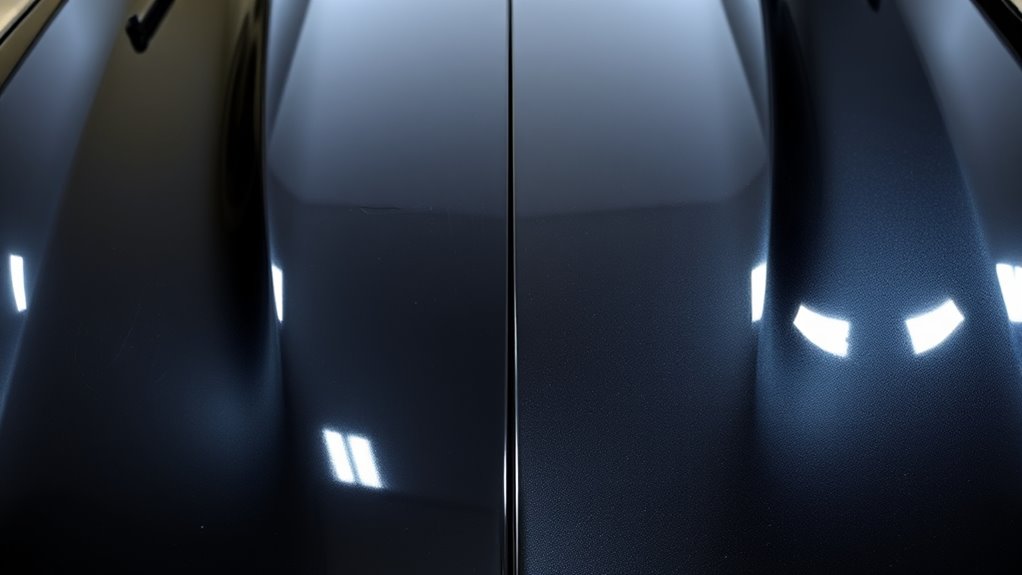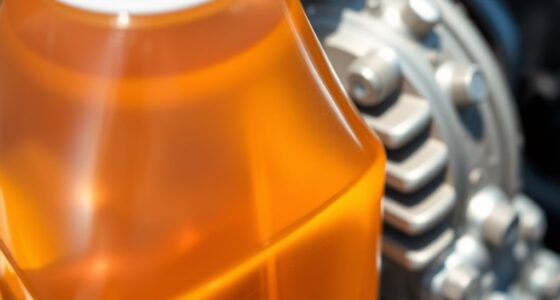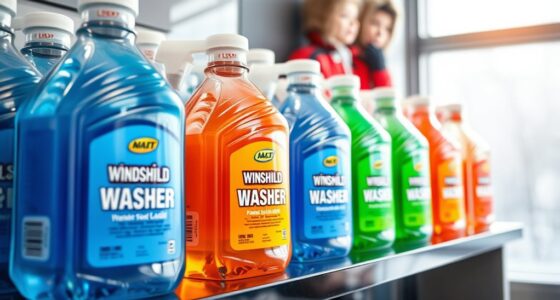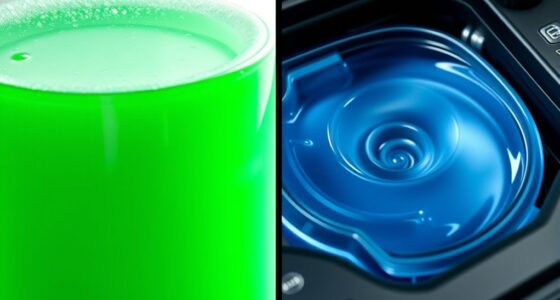Conventional car coatings offer basic protection but tend to wear out quickly and require frequent reapplication, especially under UV exposure. Ceramic coatings bond chemically with your vehicle’s surface, creating a durable barrier that resists UV rays, contaminants, and scratches. They also provide a glossy, reflective finish that lasts for years with minimal maintenance. If you want to understand the key differences and benefits further, you’ll find valuable insights if you keep exploring.
Key Takeaways
- Ceramic coatings form a chemical bond with the paint, offering longer-lasting protection than conventional waxes or sealants.
- They provide superior UV resistance, helping maintain paint color and gloss over several years.
- Ceramic coatings resist contaminants like bird droppings and grime better, reducing the need for frequent cleaning.
- Unlike traditional coatings, ceramic coatings create a hydrophobic surface that simplifies maintenance and minimizes polishing.
- Overall, ceramic coatings deliver more durable, glossy, and protective results, making them a smarter investment for vehicle care.
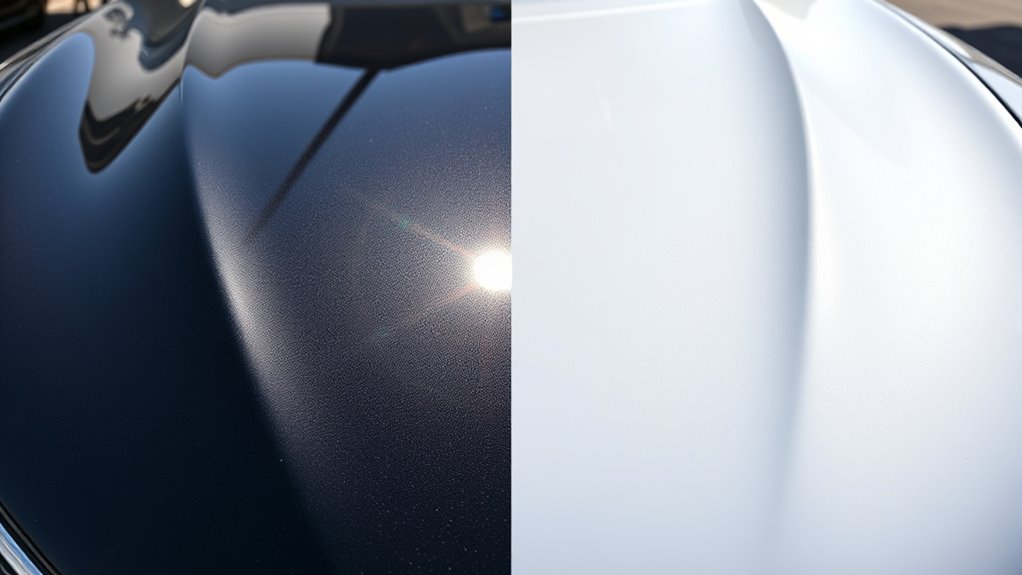
Are traditional car coatings truly the best way to protect your vehicle, or is ceramic coating the smarter choice? When it comes to safeguarding your car’s paint, you want something that not only preserves its appearance but also withstands the test of time. Conventional waxes and sealants have long been the go-to options, but ceramic coatings are gaining popularity for good reason. One of the key advantages of ceramic coatings is their exceptional UV resistance. Over time, prolonged sun exposure can cause your car’s paint to fade, chalk, or become dull. Traditional waxes offer some protection, but they tend to degrade quickly under UV rays, requiring frequent reapplications. Ceramic coatings, however, form a chemical bond with the surface, providing a durable barrier that shields your paint from harmful UV rays for years. This means your vehicle maintains its vibrant color and glossy finish longer, with less upkeep.
Ceramic coatings offer superior UV protection, keeping your car’s paint vibrant and glossy longer.
Gloss retention is another critical factor to contemplate. With conventional coatings, you might notice your car losing that initial shine after a few washes or months. Waxes and sealants can fill in minor scratches temporarily, but they often wear down quickly, leaving your paint looking lackluster. Ceramic coatings excel here because they create a hard, smooth surface that reflects light more effectively. This results in a deep, mirror-like gloss that endures through washes and weather conditions. Plus, because ceramic coatings are resistant to contaminants like bird droppings, tree sap, and road grime, they help preserve that stunning appearance over time. You’ll spend less time polishing and more time enjoying your vehicle’s sleek look.
Another aspect to think about is how these coatings impact your car’s maintenance. Traditional coatings often require regular reapplication to keep up their protective and aesthetic qualities. Ceramic coatings, on the other hand, tend to last several years with just minimal maintenance—usually just a gentle wash and occasional detail spray. Their hydrophobic properties also cause water to bead and roll off, taking dirt and grime with it, so cleaning becomes easier and less frequent. This not only saves you time but also reduces the need for aggressive cleaning products that could harm your paint.
Ultimately, while conventional coatings can offer some protection and shine, ceramic coatings provide a longer-lasting solution with superior UV resistance and gloss retention. They’re an investment that pays off by keeping your vehicle looking newer, brighter, and better protected against the elements for years to come. If you want to maximize your car’s appearance and minimize maintenance, ceramic coating is undoubtedly the smarter choice.
Frequently Asked Questions
How Long Does Each Coating Typically Last Before Reapplication?
Conventional coatings usually last around 6 months to a year, while ceramic coatings offer a longer lifespan, typically 2 to 5 years. The durability comparison shows ceramic coatings resist UV rays, chemicals, and scratches better, extending their lifespan estimates. You’ll need to reapply conventional coatings more frequently, but ceramic coatings provide a longer-lasting shield, reducing the need for frequent reapplications and offering better protection over time.
Are Ceramic Coatings More Environmentally Friendly Than Conventional Options?
Yes, ceramic coatings are generally more environmentally friendly than conventional options. They have a lower environmental impact because they require fewer reapplications, reducing waste and chemical runoff. Plus, their durable, long-lasting nature means you use fewer products over time. The eco-friendly benefits include less frequent washing and fewer harsh chemicals needed for maintenance. Overall, choosing a ceramic coating helps protect your car and the environment simultaneously.
Can Coatings Be Applied to All Types of Vehicle Paint?
Think of coatings as a tailored suit—while they fit many, not all are perfect for every vehicle. You can’t blanket every paint type with the same coat, as paint compatibility varies. Some coatings may face application challenges on certain finishes, leading to uneven coverage or adhesion issues. Always check manufacturer guidelines to make certain your car’s paint is compatible, so your coating can perform its best without any hiccups.
What Are the Potential Risks or Downsides of Ceramic Coatings?
You should be aware that ceramic coatings have some risks. Durability concerns mean the coating might wear down over time, especially if not applied properly. Chemical sensitivities can cause issues if you use harsh cleaning products, which may damage the coating or reduce its effectiveness. Additionally, improper application can lead to uneven coverage or difficulty removing the coating later, so professional installation is often recommended to avoid these potential downsides.
How Do Coatings Affect the Resale Value of a Vehicle?
Did you know that a vehicle with a ceramic coating can see a 10-15% boost in resale value? Coatings enhance resale value by protecting your paint and maintaining its appearance longer, which appeals to buyers. Their durability means your car stays looking newer, making it more attractive at resale. Overall, investing in a quality coating can pay off when it’s time to sell, thanks to better paint condition and increased appeal.
Conclusion
Choosing between conventional and ceramic coatings depends on your priorities, but ceramic coatings offer superior protection and longevity. Did you know that ceramic coatings can last up to five years, compared to just a few months for traditional wax? This durability means fewer reapplications and better resale value for your car. Ultimately, investing in a ceramic coating can save you time and money while keeping your vehicle looking showroom-ready longer.
